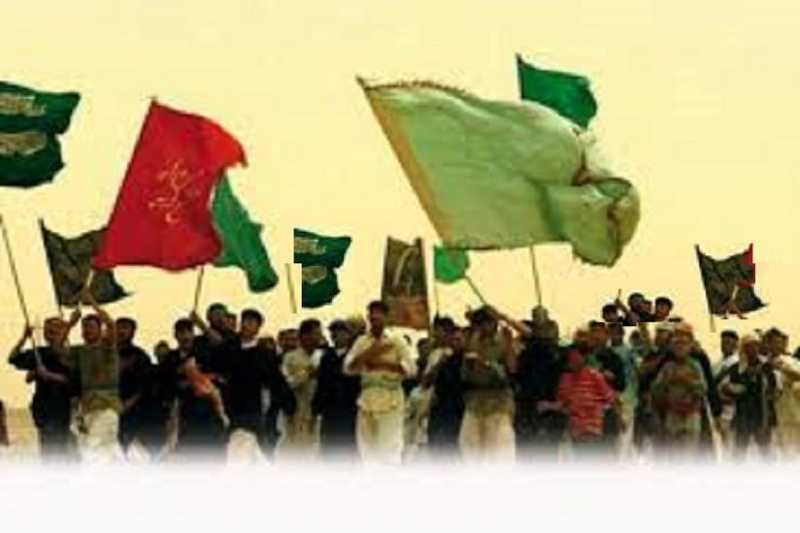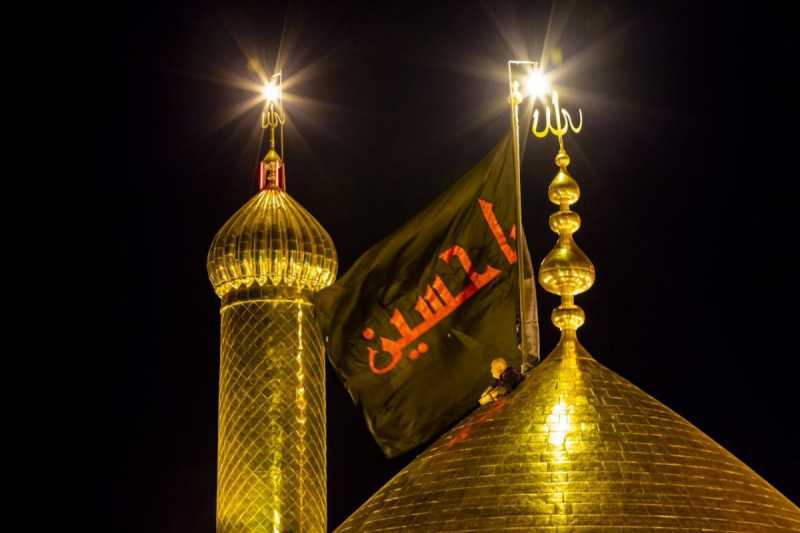أجمعهم من أطراف الأرض ، من هم هؤلاء ؟ I Collect them from the Earth Extremities Who Are They?

2021/02/03
لا اريد ان اكتب موضوعا بقدر ما اريد جوابا على اسئلة ولدتها
قراءة لنصوص لا زال يلفها الغموض من كل جوانبها . فمن المعروف
ان قبور أعداد هائلة من الأنبياء مفقودة ولا يوجد لها اثر
ولولا ان الكتب السماوية جاءت على ذكرهم لأصبحوا من الماضي
الذي لا نعرف عنه شيئا.
وكذلك نعرف ان قبور بعض الانبياء الموجودة وهي قليلة
ومعروفة خصوصا في العراق والشام وفلسطين وأجزاء من إيران
هذه القبور لا نرى لها زوارا من الديانة اليهودية او
المسيحية والصابئية بل نرى أن المسلمين يتعهدونها
بالرعاية والزيارة .
فلم نر في اي زمن ارتالا من البشر تتقاطر على قبر من
قبور هؤلاء الأنبياء ولا في اي يوم من أيام السنة .
فإذا كان كذلك فلمن تعود هذه النصوص الموجودة في
الكتاب المقدس والتي تمتدح زحفا بشريا سنويا باتجاه
قبر شخص واحد فقط . وتخبرنا هذه النصوص بأن هذه
الأرتال البشرية لا تأت من ذاتها بل أن الرب هو الذي
جمعها وأتى بها من اطراف الأرض من الشمال والجنوب
والشرق والغرب وهذه الحشود المليونية مهما كبرت فهي
لا تجوع ولا تتعب ولا تعطش وتسير في طريق مليئة
بالماء ولا يعثرون فيها ارضٌ سمحة سهلة لا عثرة فيها
.
صحيح ان النص قديم ولكن كما نعرف ان كلام الرب
ابدي ويصلح لكل زمان ومكان فلا قديم ولا جديد في
كلام الرب، لأنه يسير مع الرب ووجوده مع وجود
الرب لا يفترقان ، ولكن الرب يُطوره برسالات
جديدة وفق متطلبات كل زمان.
يقول النص كما في سفر إرميا 31: 8 ((هأنذا
آتي بهم من أرض الشمال، وأجمعهم من أطراف
الأرض. بينهم الأعمى والأعرج، الحبلى والماخض
معا. جمع عظيم يرجع إلى هنا بالبكاء يأتون،
وبالتضرعات أقودهم. أسيرهم إلى أنهار ماء في
طريق مستقيمة لا يعثرون فيها . هكذا قال
الرب: صوت، نوح، بكاء مر. راحيل تبكي على
أولادها، وتأبى أن تتعزى عن أولادها لأنهم
ليسوا بموجودين هكذا قال الرب: امنعي صوتك عن
البكاء، وعينيك عن الدموع، لأنه يوجد جزاء
لعملك، يقول الرب. ويوجد رجاء
لآخرتك)).
النص المذكور وكعادت من دوّن التوراة
اختلط بالكثير مما ليس منه . ولذلك نرى
ان المفسرين تحاشوا ان يمروا بهذا النص .
فانطونيوس فكري لم يتعرض له في تفسيره .
ولكن القمص تادرس يعقوب فسره تفسيرا
فلسفيا لا يفهم منه احد شيئا ولكنه اشار
من حيث لا يدري إلى مكان الحدث فقال أنه
في بابل (1).
وبناءا على ذلك سوف يبقى هذا النص
غامضا إلى أن يأتي من يقول لنا من
هؤلاء الذي سوف يأتي الله بهم على مر
الازمان في موسم معين لا يمنعهم عائق
ويتكاثرون بمرور الازمان؟ ومن المرأة
التي تبكي على أولادها ولا تسكت ابدا
وتأبى ان تتعزى والتي يُعزيها الرب
الله حيث يقول لها : ان هناك جزاء
لعملك ورجاء لآخرتك.
المصادر والتوضيحات
ـــــــــــــــــ
1- المشكلة التي وقع فيها
المفسر هنا انه جمع المتناقضين
، ففي بداية النص يقول بأن
القادمين لزيارة هذا المكان
ياتون بالفرح والرقص ، ولكنه
في آخر النص يقول بأنهم يأتون
بدموع وتوبة وان الرب سوف
يهبهم عوض النوح فرح وراحة
وسعادة عوض الحزن كما نرى في
تفسير الكتاب المقدس ، العهد
القديم ، القمص تادرس يعقوب ،
أرمياء 31 . فيقول : ((زينتهم
الفرح المستمر، تخرج دومًا
لتجد النفوس المحيطة ترقص
وتتهلل بالرب العامل فيها
وفيهم! بعد أن علقت قيثاراتها
على الصفصاف في) بابل) وتعيش
في تهليلٍ لا ينقطع. يأتي الله
بالأعمى فيكون له عينًا، يريه
الطريق ويدخل به إلى المجد!
يأتي بالأعرج كمن يحمله على
الأذرع الإلهية ليمارس العمل
الفائق بقوةٍ.يأتي بالحبلى
والماخض العاجزتين عن الحركة
لأمتارٍ قليلة ليسرع بهما لا
إلى أميال بل إلى الخروج من
محبة العالم إلى السماء عينها!
يصحبه فرح عظيم وسط دموع
التوبة مع تفجر أنهار الروح من
لصخور عوض النوح يحل الفرح،
ويهبهم الله راحة وسعادة عوض
الحزن. بالبكاء يأتون
وبالتضرعات أقودهم))
Written by:
Izapilla
Penijamin
Translated by:
Inam Al-Sharifi
I by no
means
intend to
write an
article as
much as to
answer
questions
which have
arisen from
my readings
of texts
riddled
with
mystery all
over. It is
common
knowledge
that a big
sundry of
the
prophets'
graves is
missing and
untraceable.
Had not the
Holy Books
of Heaven
cited their
names, they
would have
been a
bygone and
abandoned
past.
It is
undeniable
however
that
the
scanty
number
of
graves
marked
for
prophets
which
are
mostly
located
in
Iraq,
Syria,
Palestine
and
some
parts
of
Iran,
are
witnessing
no
pilgrims
from
the
Jews,
Christians
and
Sabians
while
being
densely
visited
and
attended
for by
Muslims.
There
is
no
day
of
the
year
when
we
witness
multitudes
of
people
flowing
in
succession
and
flocking
around
a
grave
relating
to
some
prophet,
which
makes
us
wonder
to
whom
these
texts
refer;
texts
from
the
holy
Book
which
eulogise
a
human
rally
heading
towards
a
specific
grave
of
one
and
only
person.
These
texts
proclaim
that
this
massive
march
is
not
self-motivated
but
prompted
by
God.
God
has
assembled
these
great
multitudes
from
the
extremities
of
earth:
north,
south,
east
and
west.
They
neither
suffer
from
hunger
nor
thirst
or
exhaustion;
they
walk
in
a
way
bountiful
with
water,
through
an
even
smooth
ground
where
no
bumps
to
stumble
upon.
Truly
the
text
is
old,
but
as
is
known,
God
words
are
universal
and
perpetual
keeping
pace
with
every
time
and
place;
they
can
neither
be
old
nor
new,
for
they
are
inseparably
intertwined
with
God
existence
and
they
are
only
developed
by
God
as
new
Messages
and
tailored
to
meet
the
demands
of
every
place
and
time.
The
text
states:
“Behold!
I
will
bring
them
from
the
North
Country,
and
gather
them
from
the
recesses
of
the
earth.
Among
them
the
blind,
and
the
lame,
the
pregnant
one,
and
the
travailing
one
together,
a
great
company
shall
return
here.
They
shall
come
with
weeping,
and
I
will
lead
them
with
prayers.
I
will
cause
them
to
walk
by
rivers
of
waters,
in
a
right
way;
they
will
not
stumble
in
it....”
(Jeremiah
31:
8-12)
“So
says
YAHWEH,
A
voice
was
heard
in
Ramah,
wailing,
bitter
weeping:
Rachel
weeping
for
her
sons;
she
refuses
to
be
comforted
for
her
sons
for
they
are
not
here.
So
says
YAHWEH,
Hold
back
your
voice
from
weeping,
and
your
eyes
from
tears.
For
there
will
be
a
reward
for
your
work,
says
YAHWEH,
and
they
shall
come
again
from
the
land
of
the
enemy.
And
there
is
hope
for
you
in
the
end
time.”
(Jeremiah
31:
15-16)
As
typically
the
Torah
scribes
were
used
to
tamper
with
the
body
text,
the
above
excerpt
is
heavily
invaded
by
exotic
material,
and
as
a
result
the
exegetists
have
been
evading
it.
Antonius
Fikri
skipped
it
in
his
exegesis
book
while
priest
Tadros
Yacoub
paraphrased
it
in
a
vague
philosophical
manner,
indecipherable
by
others,
though
somehow
or
another
he
indicated
the
place
of
the
event
as
Babylon.
Accordingly,
this
text
will
remain
a
riddle
until
afterwards
someone
steps
in
to
tell
us
who
are
those
people
that
God
would
bring
them
in
each
and
every
era
on
a
specific
event,
undeterred
by
any
obstacle;
and
constantly
proliferating
with
the
passage
of
time;
and
who
is
the
woman
that
weeps
ceaselessly
for
her
sons
refusing
to
be
consoled
by
anyone
but
by
God
alone,
whereby
she
was
promised:
there
will
be
a
reward
for
your
deed
and
some
hopefulness
for
your
Thereafter.
References
&
Illustrations
The
problem
into
which
Tadros
Yacoub
lapsed
is
that
he
combines
two
contradictory
points.
At
first,
he
maintains
that
the
pilgrims
would
come
to
this
place
rejoicing
and
dancing
while
at
the
end
he
says
they
come
tearful
and
repentant,
and
God
will
grant
them
happiness,
appeasement
and
joy
to
substitute
for
the
sob
and
sorrow,
as
seen
in
his
exegesis
book
of
the
Old
Testament
(Jeremiah
31):
«Their
ornament
is
an
incessant
delight.
Anytime
you
head
out,
you
meet
up
with
the
surrounding
souls
nimbly
dancing
and
rejoicing
for
God
who
animates
them,
so
they
indulge
in
an
ongoing
amusement!
This
is
all
upon
hanging
their
harps
on
willow
trees
in
Babylon.
Henceforth,
Allah
would
bring
the
blind
to
act
as
his
eyes
guiding
his
way
and
leading
him
to
glory!
Bring
the
lame
as
if
carried
by
divine
arms
to
powerfully
and
actively
embark
on
work!
Then
he
gets
the
pregnant
one,
and
the
travailing
one
who
are
capable
of
moving
no
more
than
a
few
metres,
and
yet
with
fast
steps
they
move
not
solely
for
miles
but
out
of
this
World
of
affection
towards
Heaven
itself,
accompanied
by
huge
happiness
amid
the
tears
of
repentance
and
the
gushing
rivers
of
souls
from
the
rocks.
Their
mourning
will
turn
into
joy,
and
Allah
will
bestow
upon
them
comfort
and
happiness.
Weeping
they
come
and
through
their
earnest
beseeches
I
would
lead
them.»







